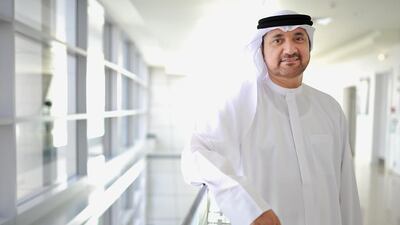AL AIN // The country’s oldest university must change if it is to keep up with the economy, academics say.
UAE University in Al Ain climbed from the 101-to-110 bracket in the Times Higher Education Asia rankings last year to 83 this year, but vice chancellor Professor Mohammed Albaili said this was “not sufficient for the UAE, so we have to work together to advance the university”.
Prof Nagi Wakim, dean of the college of graduate studies, agreed. “I’ve advocated the need for reform for a long time,” he said.
Moving away from classical subjects such as maths and physics towards modern adaptations, applicable to careers, such as nuclear physics or astrophysics, was vital for today’s students.
“We need to take programmes and reform then,” Prof Wakim said. Some courses are even becoming obsolete now, such as e-business, which is being replaced by the likes of cyber security.
He said reform within an institution as established as UAEU has its challenges. “The older you are and the bigger you are, the less able to diversify you are,” Prof Wakim said.
“It’s easier for these younger, smaller institutions to adapt, but all institutions should constantly be reforming. Higher education here is a little behind – it should push and enable new thinking at government level but, just now, it’s the other way around.”
The university must put more focus on its graduate programmes, said its provost, Prof Ghaleb Alhadrami.
“To become research-intensive, we need to focus on the graduate programmes and the more people we have in these programmes, the more research-focused we can become.”
Funding challenges remain a barrier to research activity - one of the key factors that helps determine the ranking of a university.
Set up in 1976, UAEU now has an array of disciplines, from medicine and health sciences to education and several research centres, but it is still not producing the amount of research required to elevate it greatly in the rankings.
Dr Shawqi Kharbash, chief executive of the university’s science park, graduated from the institution in 2001. Having seen the university grow since then, he agrees it is time to reform.
“We need to reform the way we teach the students, the skills we teach them, not teaching them to learn the things we learnt but teaching them to be adaptable, and we must be adaptable and the curriculum must constantly be revised,” he said.
Prof Albaili said: “Forty per cent of the current jobs will disappear and other jobs will emerge in the coming years, therefore we have to reform our programmes and equip our students with skills for the next era.
“The whole world is talking about the fourth industrial revolution, which will affect everything in our life, therefore everything will be different.”
He said it is vital the institution does not get “left behind”.
“One of our weaknesses is industry involvement. We need to generate more money through our partnerships with industry,” Prof Albaili said.
Reforms will also extend to student experiences, he added. “What we are missing here is the practical side of our majors. We will allow our students to go out into the field.”
Although they do three months of internships, he wants students to be fully employed in their target industry for six months, within their study time.
mswan@thenational.ae

